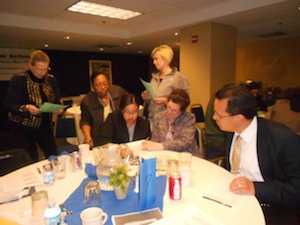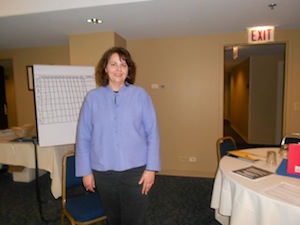Fair Housing training held in Chicago
Under a FHIP grant from the U.S. Department of Housing and Urban Development (HUD), Consumer Action’s efforts to educate community based organizations about consumer fair housing rights kicked into gear in recent months, with free trainings in Oakland, Atlanta and the Chicago area. At the Chicago train-the-trainer event, agencies from the Windy City area, Michigan and Ohio received a wealth of information from Consumer Action's Los Angeles-based trainers Linda Williams and Nelson Santiago as well as local representatives of HUD's Office of Fair Housing and Equal Opportunity (FHEO), the Illinois Department of Human Rights (IDHR) and the HOPE Fair Housing Center.
Kimberly Nevels, FHEO intake branch chief, and Marian Honel, IDHR fair housing division manager, launched the training with a presentation and discussion of the complaint handling process at their respective agencies. Nevels mentioned various laws that along with the Fair Housing Act protect consumers' fair housing rights. Her presentation included a reference to new HUD regulations protecting LGBT consumers titled "Equal Access to Housing in HUD Programs – Regardless of Sexual Orientation or Gender Identity." Among other things, the rule requires owners and operators of HUD-assisted housing, or housing with HUD-insured financing, to make housing available without regard to sexual orientation or gender identity. The rule also prohibits lenders from using sexual orientation or gender identity as a basis for determining a borrower’s eligibility for FHA-insured mortgage financing. Nevels noted that just one day before the training, the new rule was featured on MSNBC's Mellisa Harris-Perry show.
 Marion Honel of IDHR discussed specific protections —including those that exceed rights protected under the FHA— available to Illinois and Chicago residents, noting that Chicago has historically seen lots of segregation as well as a high level of discrimination directed at the Latino community. Illinois protects particular groups of people from housing discrimination just like the FHA does, but it expands the list of protected classes to include age, ancestry, marital status, sexual orientation, and "order of protection status" for victims of domestic violence.
Marion Honel of IDHR discussed specific protections —including those that exceed rights protected under the FHA— available to Illinois and Chicago residents, noting that Chicago has historically seen lots of segregation as well as a high level of discrimination directed at the Latino community. Illinois protects particular groups of people from housing discrimination just like the FHA does, but it expands the list of protected classes to include age, ancestry, marital status, sexual orientation, and "order of protection status" for victims of domestic violence.
Honel explained that the city of Chicago adds to this list people who receive Section 8 housing assistance. Honel noted that unlike the FHA, Chicago and Cook County fair housing laws do not exempt owner-occupied buildings with four units or less. Also noteworthy was Honel's explanation that anti-discrimination laws in the state of Illinois also apply to commercial real estate transactions where, for example, racial discrimination might be indicated by a refusal to allow the posting of certain signs or the serving of particular foods. During the presentation of the Recognizing and Fighting Housing Discrimination educational module, Consumer Action's Nelson Santiago walked participants through the first half of the lesson plan.
Santiago emphasized Consumer Action's goal of providing participants with tools, information and resources to help them educate their clients on fair housing rights. Santiago's segment included a discussion of the protected classes under the Fair Housing Act, examples of discrimination in rental and real estate sales, and exemptions under the Fair Housing Act. Santiago suggested two resources where participants can find detailed examples of fair housing cases pursued by HUD and/or the Department of Justice: (1) HUD's "What's New in Fair Housing" page and (2) the U.S. DOJ page on "Recent Accomplishments of the Housing & Civil Enforcement Division." Santiago suggested that cases found at these sites can be helpful in further illustrating the concepts in the lesson plan.
Consumer Action's Linda Williams trained participants on the second half of the educational module. She opened her session with tips on ways to effectively present the housing discrimination training material to diverse audiences. Williams explained that trainers are moving away from lecture-based trainings to using a variety of games and activities to cater to the diverse needs of their audience. She noted that training activities will help not only facilitate learning but will keep participants energized, especially if the training activity has them getting up and moving around.
Williams then covered housing discrimination in the context of homeowners insurance and also trained participants on the fair housing rights of disabled renters and buyers. Williams engaged participants by covering material in an interactive "quiz" format giving teams of participants an opportunity win a prize for their team by correctly answering questions. During the session participants tackled hypothetical case studies from the Recognizing and Fighting Housing Discrimination Lesson Plan and also answered questions posed by Williams based on the material in the Joint Statements from HUD and the DOJ on reasonable accommodations and reasonable modifications. Williams pointed out that participants can use the Joint Statements as additional preparation tools for their client workshops.  During the final segment of the training, HOPE Fair Housing Center Executive Director Anne Houghtaling described her agency's work as a private, non-profit fair housing organization. On the same morning of the training, Houghtaling participated in a press conference announcing the federal housing discrimination complaint filed against U.S. Bancorp and U.S. National Bank by the National Fair Housing Alliance (NFHA), Hope Fair Housing and three other members of NHFA.
During the final segment of the training, HOPE Fair Housing Center Executive Director Anne Houghtaling described her agency's work as a private, non-profit fair housing organization. On the same morning of the training, Houghtaling participated in a press conference announcing the federal housing discrimination complaint filed against U.S. Bancorp and U.S. National Bank by the National Fair Housing Alliance (NFHA), Hope Fair Housing and three other members of NHFA.
Houghtaling talked about her agency's role in the undercover investigation that found that U.S. Bank's foreclosed properties in White areas are much better maintained and marketed than its properties in African-American and Latino neighborhoods. Houghtaling also talked about fair housing "testing" conducted by her agency since 1978. She explained that before housing providers are contacted about fair housing complaints, the agency conducts fair housing "tests" as part of the investigation. Through testing the agency can investigate whether home seekers are treated differently because of their membership in a protected class, such as race, religion, disability, etc.
Houghtaling mentioned, for those who might be interested, that her agency is always looking for testers of different backgrounds. More information on HOPE's tester training and other services can be found at http://hopefair.org/index.html.
Before adjourning the training Williams and Santiago reminded participants that all the materials created as part of the partnership with HUD are free and available in five languages: English, Spanish, Chinese, Korean, and Vietnamese. Participants were also informed of free posters available for office display. Publication orders received on the day of the training totaled some 3,300 pieces and were handled on an expedited basis. By the end of April, total brochures ordered since the project launched totaled over 160,000.



